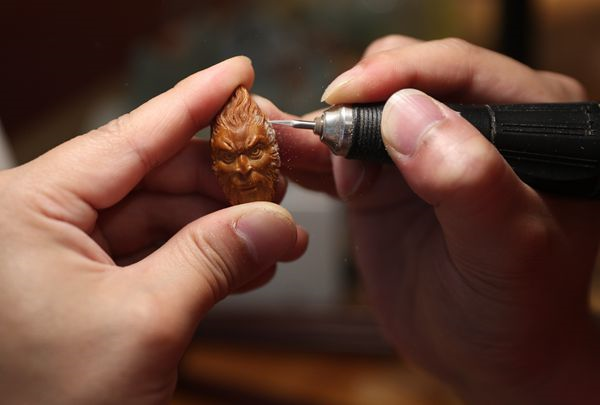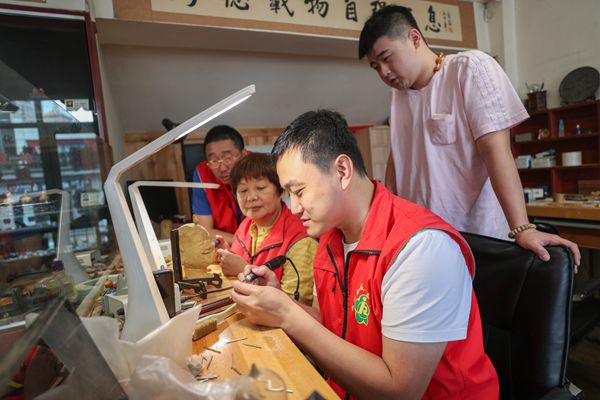
From the People's Daily app.
And this is Story in the Story.
Social norms to support and help persons with disabilities have been established in China, according to a white paper released by the State Council Information Office (SCIO).
The third Sunday in every May was designated as National Day for Helping Persons with Disabilities in 1991.
Every year, public welfare activities to help people with intellectual disabilities are organized, and a variety of other activities for children with disabilities are also carried out by charity and volunteer organizations, the white paper said.
Sporting activities, art performances, and vocational skill competitions for people with disabilities are held to celebrate the spirit of self-improvement and resilience.
Various initiatives have been set up in primary and secondary schools, colleges, and among young people to help persons with disabilities.
The China Association of Volunteers for Persons with Disabilities was established to unite all social forces in providing better services for persons with disabilities.
Today’s Story in the Story looks at how China has continued to support and improve the livelihood of those living with disabilities.

Ci Xiang works on a piece of fruit-pit carving. (Photo: Xinhua)
Pushing her way off a crowded bus, Yan Ming, 60, strolls down the road toward a small workshop with the help of a crutch and warmly greets her workmates as she enters.
She takes a seat, puts on her reading glasses and plays with her "dental drill" (an electric carving tool) and gravers in the light of a desk lamp, carving an ear of corn out of a single olive stone.
Yan has spent the past three years as an apprentice learning the intricate Chinese folk art of fruit-pit carving, superb craftsmanship that turns fruit pits into exquisite handicrafts.
The centuries-old traditional craft first came into vogue during the Ming (1368-1644) and Qing (1644-1911) Dynasties, in which fruit pits of olives, peaches, walnuts were used to create life-like minute sculptures of figures, landscapes, architecture, flowers or birds.
Yan puts her right little finger against her left thumb to stop it trembling, a hangover from almost six years spent recuperating in a wheelchair after a craniotomy she received following a severe car accident in 1999.
"When I was a green hand, it was hard for me to stop bleeding as the drill usually went into my badly shaking fingers," she said.
Ci Xiang would always come over and pat his discouraged apprentice on the shoulder, and sometimes give her a hug to calm her down when she fidgeted and lost focus.
The 31-year-old is the founder of the workshop which has taken in 16 members, all with disabilities, to learn fruit-pit carving for free.
He shares the same misfortune with Yan, just in a different form-being diagnosed with mental illness since grade three in primary school.

Ci Xiang (front) teaches fruit-pit carving at his workshop, which has taken in 16 members, all with disabilities, to learn the handicraft for free. (Photo: Xinhua)
When one door closed, another opened. Ci has a gift for fruit-pit carving. With the help of his father, he was lucky to learn the craft from Li Yongli, an accomplished maestro in Shenyang.
"I could tell his condition from day one, but I liked the boy very much. And he was much more focused and worked harder than normal kids," Li said.
With rapid progress made, Ci earned several awards for his artwork, which was sought after by enthusiastic collectors. The carved olive stone bracelets he made often sold for upwards of $3,000.
Having found success in fruit-pit carving, Ci came up with the idea of running a workshop and giving free lessons on the crafts to disabled people like him to help them.
With the support of the local disabled persons' federation, Ci founded his studio in 2016.
Yan was among Ci's first students. She calls him the "young master.”
She was paid 800 yuan for her first piece of work and bought her 90-year-old mom a mobile phone for the elderly, which has an audio prompt to identify the caller.
More than one million people with disabilities in China overcame poverty in 2018. And mastering a skill not only helped them to improve their financial situation but more importantly, brought them confidence and hope.
Dong Xiaoguang, a retired jeweler who suffers from polio, rides for more than an hour every day on his electric wheelchair to Ci's workshop.
"Carving is a kind of activity that requires communicating with others, and I enjoy the process of learning and chatting,” Dong explained.
The young master and his 16 apprentices have organized many carving charity bazaars over the past three years and donated more than $30,000 to institutions like the disabled persons' federation.
(Produced by Nancy Yan Xu, Lance Crayon, Brian Lowe and Paris Yelu Xu. Music by: bensound.com. Text from Global Times and China Daily.)


